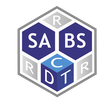News
November 2024
Industry Studentships with Interdisciplinary Life and Environmental Science Landscape Award (ILESLA)
We are not currently planning an admissions round directly to the SABS programme for 2025 Entry.
However, a new programme sharing many of the themes of the SABS programme and also offering the chance for strong interactions with industry partners is starting at the Doctoral Training Centre.
Students will tackle research challenges across five interconnected themes representing the strengths and breadth of research within the partnership : Climate and Earth, Biodiversity and Sustainability, Animal and Human Health, Rules of Life and Transformative Technologies Read more about these themes here
Industry Partnerships and Open-OIIC Studentships: The Open Innovation Industrial Consortium (Open-IIC) brings together an alliance of industry partners who are interested in undertaking research at the frontiers of life and environmental science. Participation in Open-IIC is subject to a Open Innovation agreement; all projects offered through Open-IIC will be industry-derived and jointly supervised by the industrial partner and an academic supervisor at the University of Oxford, Oxford Brookes University or the Open University, as well as supervisors employed by other ILESLA partners. Our industrial partners will also actively contribute to training offered within ILELSA. A subset of ILELSA students who are committed to working with industry will hold Open-IIC studentships and will undertake research projects with one or more Open-IIC partners. Students within the main programme will be able to optionally choose Open-IIC projects if they are not taken up by students holding Open-IIC studentships.
Please visit ILESLA - Interdisciplinary Life and Environmental Science Landscape Award for more details including how to apply.
May 2024
SABS is now open for admission in autumn 2024! Please visit our Graduate Admissions page for more details on how to apply.
April 2024
We're delighted to announce that applications to the Sustainable Approaches to Biomedical Science Centre for Doctoral Training (SABS CDT) for entry in autumn 2024 will re-open shortly.
September 2023
Applications for entry to the Sustainable Approaches to Biomedical Science Centre for Doctoral Training (SABS CDT) for entry in autumn 2024 is currently closed.
We are hoping to re-open admissions from December 2023 for a January deadline, but this is subject to funding.
July 2023
SABS Welcomes New Programme Manager
SABS R3 welcomes a new Programme Manager, Melanie Witt, whose most recent roles have been managing the EPSRC CDT in Mathematics of Random Systems, and the Administrator for the Oxford Parkinson's Disease Centre and Alzheimer's Research UK Thames Valley Network. Melanie originally moved to Oxford to work in Earth Sciences as a post-doctoral research fellow investigating volcanoes as a source of mercury, she has worked at Oxford for over 16 years, and is looking forward to working with current and future SABS R3 students, and everyone at the DTC.
November 2022
DTC Applications workshop - December 13-14 2022
The DTC is hosting an admissions workshop specifically aimed at supporting students currently under-represented at Oxford in their applications. The workshop is fully funded and includes travel, food and accommodation. We warmly encourage application by 9am Monday 5th December. For more information and to apply click here.
September, 2022
SABS R3 Open Day for Entry in 2023-24
SABS is holding an Open Day on Zoom on Wednesday 16th November 2022, from 1:30 - 3:30 pm. If you're curious about applying to SABS R3 for entry in the 2023-24 academic year, and would like to hear from current and former SABS students, we encourage you to register by emailing sabs-administrator@dtc.ox.ac.uk. We hope to see you then.
May 2022
Bernadette Stolz, SABS alumni, wins Rising Talent fellowship
Bernadette Stolz, a SABS 2014 alumni, has won the L’Oréal-UNESCO Women in Science Rising Talent fellowship in the category of Mathematics and Computer Science.
The Rising Talents Programme is designed to provide flexible and practical financial support, alongside tools and wider support, for early career women scientists to pursue their research. Five grants are awarded to outstanding women postdoctoral scientists in the fields of Physical Science, Engineering, Mathematics and Computing, Life Science, and Sustainable Development. These fully flexible Fellowships are each worth £15,000.
Bernadette's work develops techniques in topological data analysis (TDA) to study biological data, in particular dynamical networks and spatial data. Her research can be broadly categorised into three main groups: developing TDA techniques to answer biological questions arising from experimental data; developing novel data science methods based on TDA: and using TDA in combination with mechanistic models to link form and function in biological systems.
In her fellowship she will extend her work to mathematical models of tumour vasculature to enable predictions and investigate links between form and function. She will further develop techniques based on persistent homology to quantify heterogeneity in cancer tissue images and develop novel biomarkers for patient stratification, disease phenotyping, treatment prediction, and treatment scheduling. Ultimately, she hopes to make persistent homology biomarkers standard for cancer diagnosis and prognosis.
January 2022
SABS Welcomes New Programme Manager
SABS R3 welcomes in the new year with a new Programme Manager, Katherine Baysan, whose most recent roles have been in Admissions and Outreach at Corpus Christi College, and the Faculty of Law, University of Oxford. Having moved from Glasgow in 2017 she has worked at Oxford for over 4 years, and is looking forward to working with current and future SABS R3 students, and everyone at the DTC. Welcome Katherine!
November 2021
SABS R3 Open Day for Entry in 2022-23
SABS is holding an Open Day on Zoom on Wednesday, 24th November, 2021, from 11:30 am - 1 pm. If you're curious about applying to SABS R3 for entry in the 2022-23 academic year, and would like to hear from current and former SABS students, we encourage you to register by emailing sabs-administrator@dtc.ox.ac.uk. We hope to see you then.
October 2021
SABS Student Andrei-Claudiu Roibu awarded prestigious 1851 Royal Commission Industrial Fellowship
We are delighted to announce 3rd Year SABS student Andrei-Claudiu Roibu (SABS 2019) has been awarded a prestigious 1851 Royal Commission Industrial Fellowship for his project ‘Mapping brain network activity from structural connectivity using deep learning’ in collaboration with F. Hoffmann-La Roche Ltd and the University of Oxford. More information on Andrei’s project is available and also below:
"This project will help better understand the structure-function relationship in the central nervous system, a key research topic in neuroscience. In addition, it could also help in the development of treatments and procedures which could improve the lives of patients suffering from rare neurological diseases."
- £100k funding awarded to 13 young innovators to bring academia and industry together to face COVID-19, climate change and more
- Projects selected include revolutionary breast cancer detection, future coronavirus drugs, waste processing bioreactors and brain-mapping artificial intelligence
- Applications for the 2022 Industrial Fellowships are now open
London, 6 October 2021 – Talented young innovators from across the United Kingdom have been awarded prestigious Industrial Fellowships by the Royal Commission for the Exhibition of 1851, to develop solutions to some of society’s biggest challenges, from COVID-19 to climate change.
Set up by Prince Albert to organise the Great Exhibition of 1851 and extended in perpetuity to invest the profits in UK innovation, the Commission has been supporting promising research ever since. For 170 years it has provided crucial support to advance R&D and help to make UK industry more competitive internationally.
Through the Industrial Fellowships, the Commission brings together industry and academia to create commercially viable research and solutions for the mutual benefit of all. Fellows conduct their doctoral research with a company in their chosen industry, bringing academic expertise and approaches to a commercial operation. This enables students to investigate new ways of thinking about traditional problems, and forge exciting career opportunities. The programme also equips companies with cutting-edge research without the premium price tag and strengthens links between universities and commercial organisations.
This year’s Fellows will be developing new techniques for cancer diagnosis and treatment, bioreactors that can turn wastewater into energy, drugs to fight future human coronaviruses, and AI to help map pathways in the brain.
Industrial Fellowships provide funding of up to £100,000, covering salary contributions, university fees and costs for doctoral studies for up to 3 years of research. The output of such an investment is estimated at £2 million a year in intellectual property, developing crucial new technologies and scientific advances that advance research fields and British industrial players. During the Fellowship, students are provided with support from academic and industrial supervisors.
Bernard Taylor, Chairman of the Royal Commission for the Exhibition of 1851, said: “The Industrial Fellowship programme is a crucial link between British research institutions and businesses, with a specific focus on producing tangible, commercial benefits for all. This year is one of the largest ever cohorts of Industrial Fellows, representing some of the best and brightest researchers in British industry. Their work will bring together the new ideas of academia and the agility of industry, to make a significant impact in a wide range of fields, including biotechnology, artificial intelligence and telecommunications.”
Applications for the 2022 Industrial Fellowships are now open.
About the Royal Commission for the Exhibition of 1851
The Royal Commission for the Exhibition of 1851 offers major awards to scientists and engineers for research, development and design. First established to stage the Great Exhibition in 1851, the Royal Commission's extraordinary history is founded on an inspired vision of the importance of education to economic success. It has previously funded luminaries such as Nobel laureates Professor Peter Higgs, Sir James Chadwick and Paul Dirac.
May 2021
Bernadette Stolz wins Thesis Prize
Bernadette Stolz, a SABS 2014 student, has won the Mathematical Institute's Thesis Prize 2020 for her DPhil, Global and Local Persistent Homology for the Shape and Classification of Biological Data.
December 2020
EPA Cephalosporin-Linacre Scholarships
SABS R³ is pleased to announce the availability of EPA-Cephalosporin-Linacre Scholarships for eligble applicants. They are funded by the EPA Cephalosporin Fund in association with Linacre College and will provide full scholarships for students in the Oxford Interdisciplinary Bioscience Doctoral Training Partnership (DTP) and the EPSRC Sustainable Approaches to Biomedical Science: Responsible and Reproducible Research Centre for Doctoral Training (SABS R³). Scholarships will be awarded to students from socio-economic backgrounds that are under-represented in doctoral research. More informatiion can be found on our Funding and EEDI pages.
October 2020
DTC involved in pilot scheme addressing conscious and unconscious bias in graduate applications
Inspired by discussions with its students, scientific communities, and ongoing global events, SABS is taking part in the University's pilot with a limited number of courses to test actions aimed at minimising conscious and unconscious bias in its admissions procedure for graduate students.
September 2020
One in Eight Million
Congratulations to SABS alumnus Joshua Bull, a graduate student in Mathematics, who topped a field of more than eight million to win this year's Fantasy Football Premier League competition. You can find out how he did it by watching his public lecture which has already had more than 44,000 downloads. Well done, Josh!
July 2020
Congratulations to Dr Eoin Malins & DTC
We are delighted to announce that the "Introduction to Computer Programming" module, created by the DTC's Dr Eoin Malins, has been chosen as a winner of one of the five Vice-Chancellor's Education Awards this year. Professor Martin S. Williams, Pro-Vice-Chancellor for Education, said: "The entries reflected the high-quality education that takes place across University – with innovative approaches to teaching, and significant efforts taken to further improve students' educational experience at Oxford. All of the entries were highly commendable and the five winning entries showcase the range and depth of educational excellence at Oxford.
The judging panel noted of your entry that it was an excellent application, clearly-articulated and demonstrating a strong underlying pedagogic rationale. The panel were particularly impressed with the powerful use of students learning with peers, and with the previous students returning as demonstrators. There was an impressive case made for student impact. The panel noted that other groups at Oxford or elsewhere could benefit from knowing more about this project and hope that the team will continue sharing their work more widely." Pro-VC Williams went on, "Please accept my warm congratulations on this award, and my thanks for your significant contribution to academic excellence at Oxford."
March 2020
SABS Has a New Home!
We are pleased to announce that the newly-renovated Doctoral Training Centre opened at the start of March, and SABS has moved in. We are now located at 1-4 Keble Road, Oxford, OX1 3NP.
March 2020
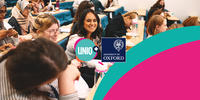
UNIQ+ now closed for 2020 applications
SABS R³ was proposed the pilot UNIQ+ programme last year, which proved to be a great success, with four D.Phil programmes joining in.
UNIQ+ gives talented UK undergraduate students from underrepresented backgrounds the opportunity to discover what postgraduate study is like at Oxford through research experience in the University’s state-of-the-art facilities, working alongside our students and staff. The 2020 programmes will run from 6 July for seven weeks (with the exception of Humanities subjects, which will be four weeks). SABS R³ will be recruiting 6 graduates again this year.
Applications for 2020 are now closed. The deadline was 12 noon on Monday 24 February 2020. Eligibility criteria: www.ox.ac.uk/graduateaccess
December 2019
This year's ChemBiOx Conference was a resounding success -- to find out more, please see the organizer's report.
November 2019
On Wednesday, December 4, 2019, at 2-4 pm, come and meet the SABS R³ Directors and current students at our annual Open Day. We will be in the Department of Statistics, University of Oxford (24-29 St Giles', Oxford, OX1 3LB).
September 2019
The Engineering and Physical Sciences Research Council (EPSRC) has appointed SABS Director Professor Charlotte Deane as Deputy Executive Chair.
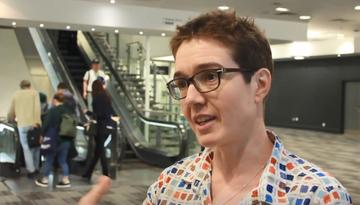
August, 2019
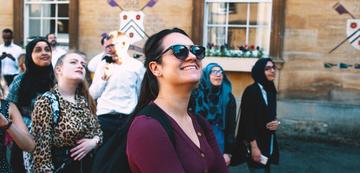
© Phil Brooks, OU
Today was the last day of the UNIQ+ Summer School—the University of Oxford's first ever postgraduate access programme. The 33 UNIQ+ Students gathered in the morning in the Mathematical Institute, and gave excellent summaries of their research projects, including the six SABS UNIQ+ Students who spent their first two weeks learning about best practices in software engineering. UNIQ+ is an initiative of SABS R³, and we thank one of our industrial partners, Roche, for their support.
3 July 2019
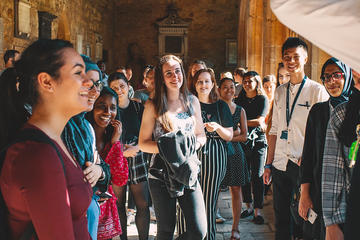
The first UNIQ+ Students were taken on a tour of New College, Oxford, before their first UNIQ+ Dinner. They were welcomed by the Warden of New College, and the Vice-Chancellor, Louise Richardson.
20 March 2019
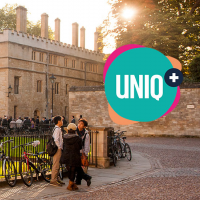
Curious about research at Oxford?
The SABS R3 CDT has launched UNIQ+, a pilot six-week Summer School for talented individuals who would find continuing into postgraduate study a challenge, because of socio-economic or financial circumstances. The programme, designed to give the chance to experience what postgraduate study is like at the University of Oxford, will run 1 July to 9 August 2019, and is currently limited to subjects in medical, biological, mathematical, and physical sciences.
The deadline for applications to the UNIQ+ programme is 12 noon on Monday, 29 April 2019, and you can find out how to apply here.

